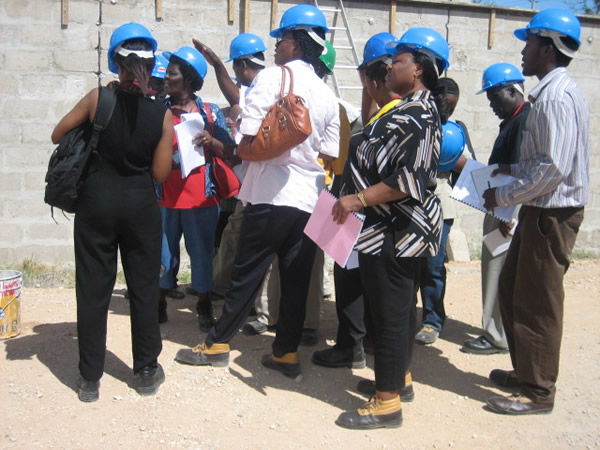Institution news
EAP was established over a decade ago by some of the UK’s renowned professional engineering institutions, including the Institution of Civil Engineers and the Institution of Mechanical Engineers. Leading companies such as AMEC, Arup and Balfour Beatty have been amongst its most consistent supporters since its inception.
A small, independent organisation with strong links to government and industry, EAPs’ expertise lies in the systems and procedures used to deliver infrastructure and its key aim is to reduce poverty through engineering better infrastructure and development solutions. It also seeks to place emphasis on the training of future engineers to embrace a global perspective in their work.
Engineers Against Poverty believe:
- Infrastructure development can make a substantial contribution to poverty reduction
- Engineers can influence the process and delivery of infrastructure development in a variety of positive ways
- The engineering community can act positively to reduce poverty
- It has the skills, experience, resources, connections and ideas to make a real difference
The organisation’s early work was in supporting small-scale appropriate technology projects in Africa and South Asia, providing immediate benefits to the individuals and communities involved. Now working towards a more strategic approach, EAP’s programme is aimed at influencing corporate and public policy in relation to investments in infrastructure. The organisation has undertaken action research in industry sectors that has led to a focus on how the systems and procedures used to deliver infrastructure can be improved to maximise the benefits to the poor.
To achieve this, EAPs’ areas of focus include increasing transparency and accountability; local content and sourcing; improving the working environment and employment conditions; reducing carbon emissions; and infrastructure investment.
EAP’s strategic partners include major international agencies, construction councils, companies, professional institutions and NGOs. Joint initiatives develop innovative policies, systems and procedures aimed at maximising the development impact of investments in infrastructure.
In 2012 EAP completed a five-year project in Tanzania to improve understanding of health and safety regulations in the construction industry, in partnership with the Institution of Engineers Tanzania and funded by the UK Department for International Development. What had been one of the most dangerous economic sectors in which to work has now gained an improvement in the income, health and well-being of construction workers in the future.
EAP’s focus on policy, systems and procedures means that it can face particular challenges when attempting to demonstrate impact. John Hawkins at EAP says:
“The impact of our work might only emerge some considerable time after our intervention. Demonstrating causality and attribution can be time consuming and difficult. In the long-term we believe that our approach is more likely to lead to reducing poverty and promoting sustainable development globally.”
The group’s work has influenced UK Government international development policy and it has developed guidance for policy makers and practitioners. EAP’s work coordinating the Construction Sector Transparency Initiative (CoST) has helped to secure endorsements for improvements in transparency and accountability from the leading multilateral development banks and the G20. The programme is currently funded by the World Bank and is operational in 10 countries. For more information visit: www.constructiontransparency.org
In addition, and in partnership with the International Finance Corporation (IFC), EAP has developed ‘A guide to getting started in local procurement’; and with IPIECA, it created ‘Local content strategy: A guidance document for the oil and gas industry’. Among a number of other publications by EAP, these resources are being widely promoted and are helping to improve approaches to local content for both the extractives and construction sectors throughout the world.
As it looks to grow the organisation, Engineers Against Poverty continues to work as a thought leader in the areas of infrastructure and international development. It needs support from donors in order to develop its programmes. The organisation is calling on members of the Institution to consider making a donation towards the work of EAP, putting the strategic skills of the engineering community to work for the benefit of those in poverty across the world.
To contact Engineers Against Poverty:
2nd Floor, Weston House
246 High Holborn London
WC1V 7EX
United Kingdom
+44 (0)20 3206 0488
www.engineersagainstpoverty.org
http://www.engineersagainstpoverty.org/donations.cfm
